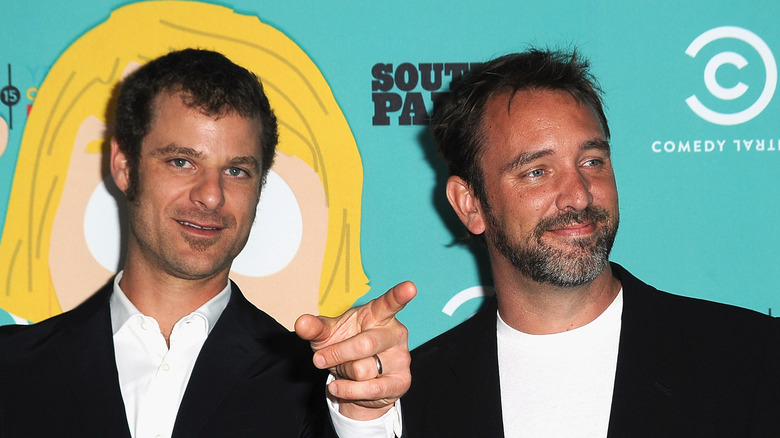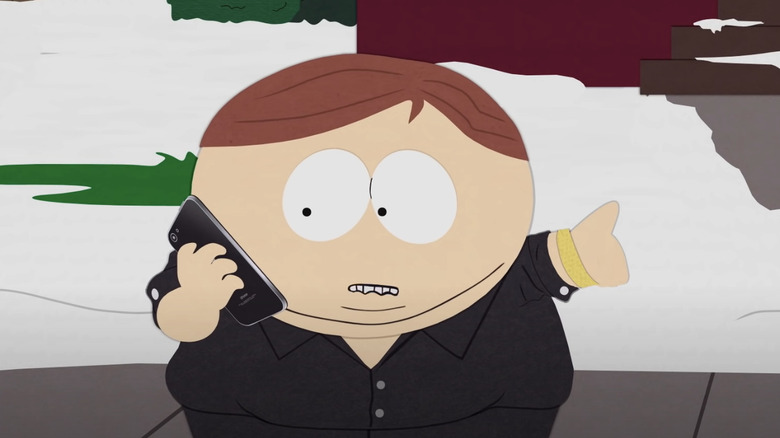How South Park's Trey Parker And Matt Stone Really Feel About Offending Their Audiences
Over the 25 years that "South Park" has remained on the air, it has managed to attack every possible group it can by being an equal-opportunity offender. No one is safe from the animated show's satire, whether it's Tom Cruise and Scientology or Kanye West and fish sticks. Celebrities, politics, religion, and other taboo topics make up the usual fodder for the show's creators Trey Parker and Matt Stone. In fact, Russian prosecutors tried in vain to ban the show at one point for fear it would incite religious hatred.
The reason Stone and Parker get away with constantly being offensive, so to speak, is because they maintain a full middle-ground stance that's not afraid to point fingers at either side of an issue. Parker told Charlie Rose in 2005, "The people screaming on this side and the people screaming on that side are the same people, and it's ok to be someone in the middle laughing at both of them."
However, Parker also stressed that "we can't just make jokes, we gotta make stories." With story and character taking the forefront in the setup of a joke, it makes the joke carry some weight. If the audience is invested in the story, the offensive nature of the joke no longer has the same shock effect. But when it comes to this shock value, how do Parker and Stone feel about audience reactions to the controversial content?
Trey Parker admitted that he doesn't enjoy hearing that someone got offended by his work
No one can fault "South Park" co-creators Matt Stone and Trey Parker for not being self-aware. In the "Stunning and Brave" episode from Season 19 of the show, Cartman comments to his friend Kenny in a moment of meta-dialogue, "We're two privileged white boys who have their laughs about things they never have to deal with." At least Stone and Parker know where they stand when they're making offensive jokes. The pair actually has some surprising feelings about offending their audiences in general.
Despite the subject matter of their show, Stone and Parker never actually set out to offend people. While some of the jokes in the show may be designed to shock audiences, the creators say they never want their audience to take away any negative feelings from their shows. In fact, they think offending their audience is just plain wrong.
In an interview with The Hollywood Reporter, Parker and Stone compared "South Park" to their Broadway show, "Book of Mormon," as both use shock humor as a storytelling device. Parker said that with something like "Book of Mormon" or "South Park," all he is attempting to do with his work is entertain an audience. He said if someone is upset by something that he's done, he gets no satisfaction from that. "That means I did it wrong. I'm just trying to make people laugh," Parker said.
Despite its abrasive comedy, good values are at the core of South Park
Trey Parker admitted in the Hollywood Reporter interview that this may not have always been the case in their minds, but their priorities had changed since they began making "South Park." In 1997, when "South Park" began its pop culture takeover, Parker and Stone were in their 20s. "It's this thing that happens rarely in the culture, where something very subversive is also very affirmative," said Book of Mormon" producer Scott Rudin about the long-running animated show. "It has affirmative values but also tears down every possible institution." That dichotomy within the show has been one of anti-establishment while also remaining pro-human-being. It shows that the creators love and appreciate their audiences as individuals, but none of the institutions they may subscribe to.
"We care about different things today," Parker said. "First, we were friends f***ing around ... breaking into Hollywood, sleeping on couches. Now Matt is married, and I've got a little family."
Parker and Stone were in their late thirties at the time of the interview. Even with its creators growing up and reaching middle age, "South Park" still manages to be on the cutting edge of comedy while maintaining that same shock value (and heart) it has had since 1997.


